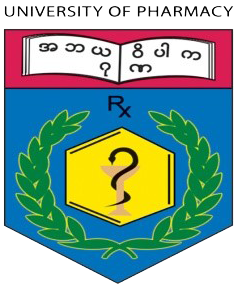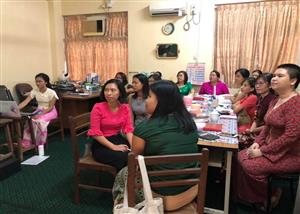History
The Department of Pharmacology opened its door together with the University of Pharmacy (Yangon) in January, 1992. The first chair of this Department was Prof. Dr. Mya Mya Than and the current head of Department is Professor Dr. Ei Ei Mon.

Prof. Dr. Ei Ei Mon
Professor and Head
M.B.B.S. (Ygn), M.Med.Sc. (Pharmacology),
Ph.D. (Medical Science) (Japan), Dip.Med.Ed.
E.mail. dreieimon2023@gmail.com
In the undergraduate teaching curriculum, Pharmacology had been put as one of the major subjects for students from second year to fourth year since the beginning. From 2003 to 2017, Pharmacology had been taught as one of the major subjects in general training of Master of Pharmacy (M.Pharm.). The Department initiated Ph.D program in Clinical Pharmacy since January, 2014, and Master program in Clinical Pharmacy since January, 2018.
Aim and Objectives
Undergraduate
- The aim of the undergraduate Pharmacology program is to train middle level manpower in the area of comprehensive health care system and Pharmaceutical Care so as to fill in the gaps in the hospitals, research institutes, and as trainers in the universities of pharmacy and allied health sciences.
-
The objectives are to train students to be able to:
-
describe the basic principles of pharmacology which include pharmacokinetics (absorption, distribution, metabolism and excretion ) and pharmacodynamics (qualitative and quantitative aspects of drug action) (K)
- describe the individual variations of drug response (K)
- describe the adverse drug reactions and the basic principles of toxicology of drugs (K)
- describe the benefits of Essential Drugs Program and Rational Prescribing Practice in drug therapy (K)
- describe the basic principles of pharmacology considered essential for rational, effective and safe use of therapeutic agents in health care (K)
- correlate the actions of drugs to their untoward effects, for the purpose tackling therapeutic problems; in particular, making appropriate choice of drugs (K)
- describe simple experiments to illustrate the principles of pharmacology and to interpret results from these experiments(K,S)
- describe the drug interactions which enable them to advise to the prescriber and user (K)
- describe the evolution of Pharmacy Practice in modern medicine (K)
- describe the role of pharmacists in comprehensive health care system (K)
- interpret clinical history and findings of physical examination of patients (K)
- describe the sequential steps of Pharmaceutical Care given to a patient (K)
Post-graduate
- The aim of the post-graduate Clinical Pharmacy program is to produce the clinical pharmacists with a broad range of knowledge, skills and resources to practice effectively as a clinical pharmacy practitioner involved in the quality use of medicines and pharmaceutical care.
- The objectives are to train students to be able:
- to develop and demonstrate progressive pharmacy practice models to advance the professional practice of pharmacists and to involve our students and residents in advanced practices
- to develop a nationally recognized team of leading researchers whose aim is to improve the quality of medication use through the study of systems, providers’ and patients’ perspectives, and behaviors that affect the medication use process; the focus is on designing and testing strategies to enhance patient adherence, reduce drug-related morbidity and suboptimal resource consumption, and improve care transitions
Former Heads
Prof. Dr. Mya Mya Than
M.B.,B.S. (Ygn),
M.Med.Sc. (Pharmacology)
Prof. Dr. Khin Maung Myint
M.B.,B.S. (Ygn),
M.Med.Sc. (Pharmacology), Ph.D. (Pharmacology)
Prof. Dr. Kyaw
M.B.,B.S. (Ygn),
M.Med.Sc. (Pharmacology),
Dip.Med.Ed.
Prof. Dr. Nang Hla Hla Win
M.B.,B.S. (Ygn),
M.Med.Sc. (Pharmacology),
Ph.D. (Pharmacology), Dip.Med.Ed.
Prof. Dr. May Hla Thwin
M.B.,B.S. (Ygn),
M.Med.Sc. (Pharmacology),
Ph.D. (Pharmacology), Dip.Med.Ed.
Prof. Dr. Marlar Myint
M.B.,B.S. (Ygn),
M.Med.Sc. (Pharmacology),
Ph.D. (Pharmacology), Dip.Med.Ed.
Prof. Dr. Yee Yee Tin
M.B.,B.S. (Ygn),
M.Med.Sc. (Pharmacology),
Ph.D. (Pharmacology), Dip.Med.Ed.
AP. Dr. Win Win May
M.B.,B.S. (Ygn),
M.Med.Sc. (Pharmacology),
Ph.D. (Pharmacology), Dip.Med.Ed.
Prof. Dr. Latt Latt Win
M.B.,B.S. (Ygn),
M.Med.Sc. (Pharmacology),
Ph.D. (Pharmacology),
Dip.Med.Ed., DCME
Prof. Dr. Aye Soe
M.B.,B.S. (Ygn),
M.Med.Sc. (Pharmacology),
Ph.D. (Pharmacology), Dip.Med.Ed., REME
Prof. Dr. K Khine Thu
M.B.,B.S. (Ygn),
M.Med.Sc. (Pharmacology),
Ph.D. (Pharmacology), Dip.Med.Ed., DCME
Prof. Dr. Yin Moe Thwe
M.B.,B.S. (Ygn),
M.Med.Sc. (Pharmacology),
Ph.D. (Pharmacology),
Dip.Med.Sc. (Clinical Pharmacology), Dip.Med.Ed.
Recent Activities
Recent Events
Recent News
Total : 0
Recent Announcements
Total : 0
Recent Blogs and Articles
Total : 0


